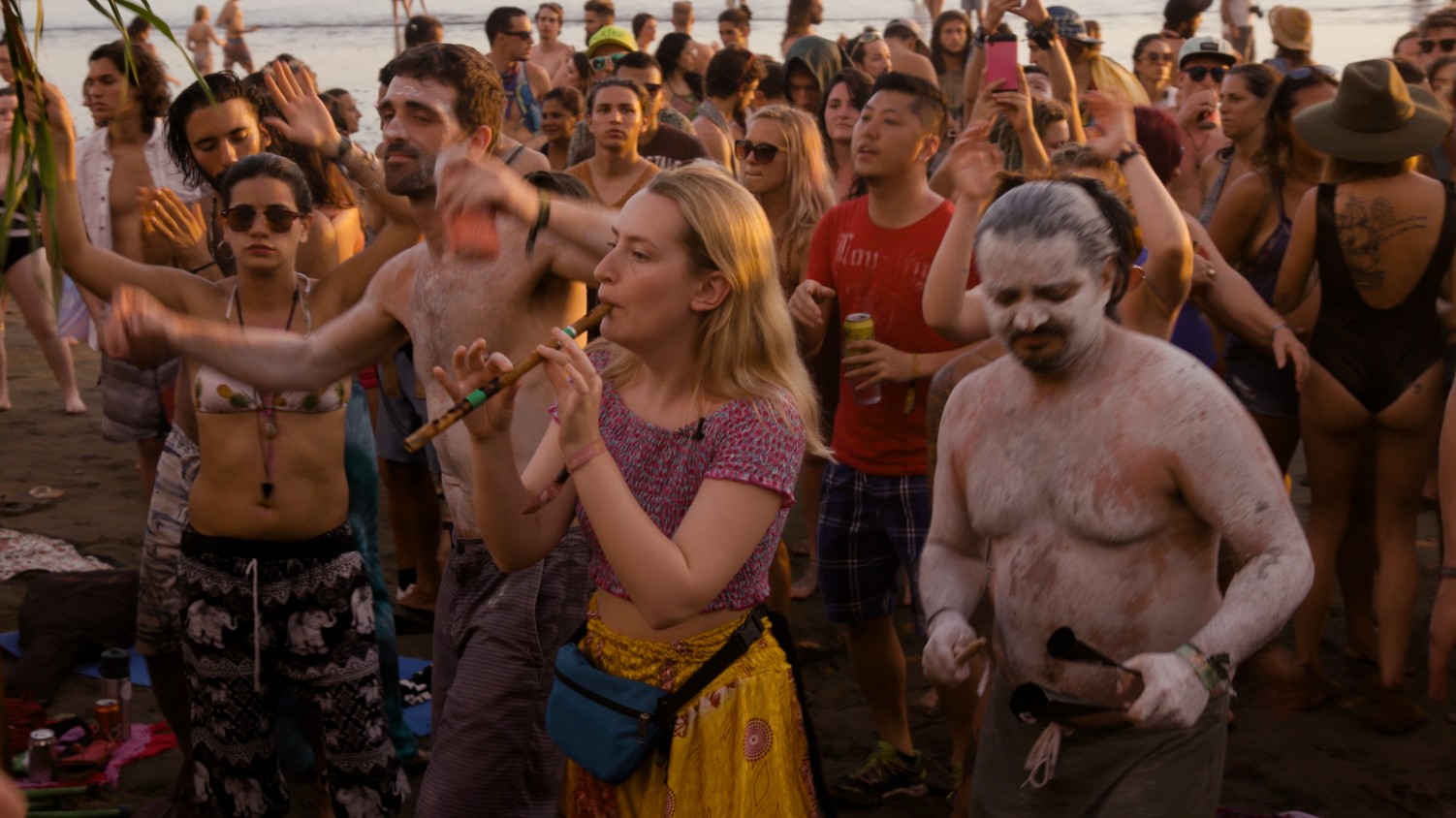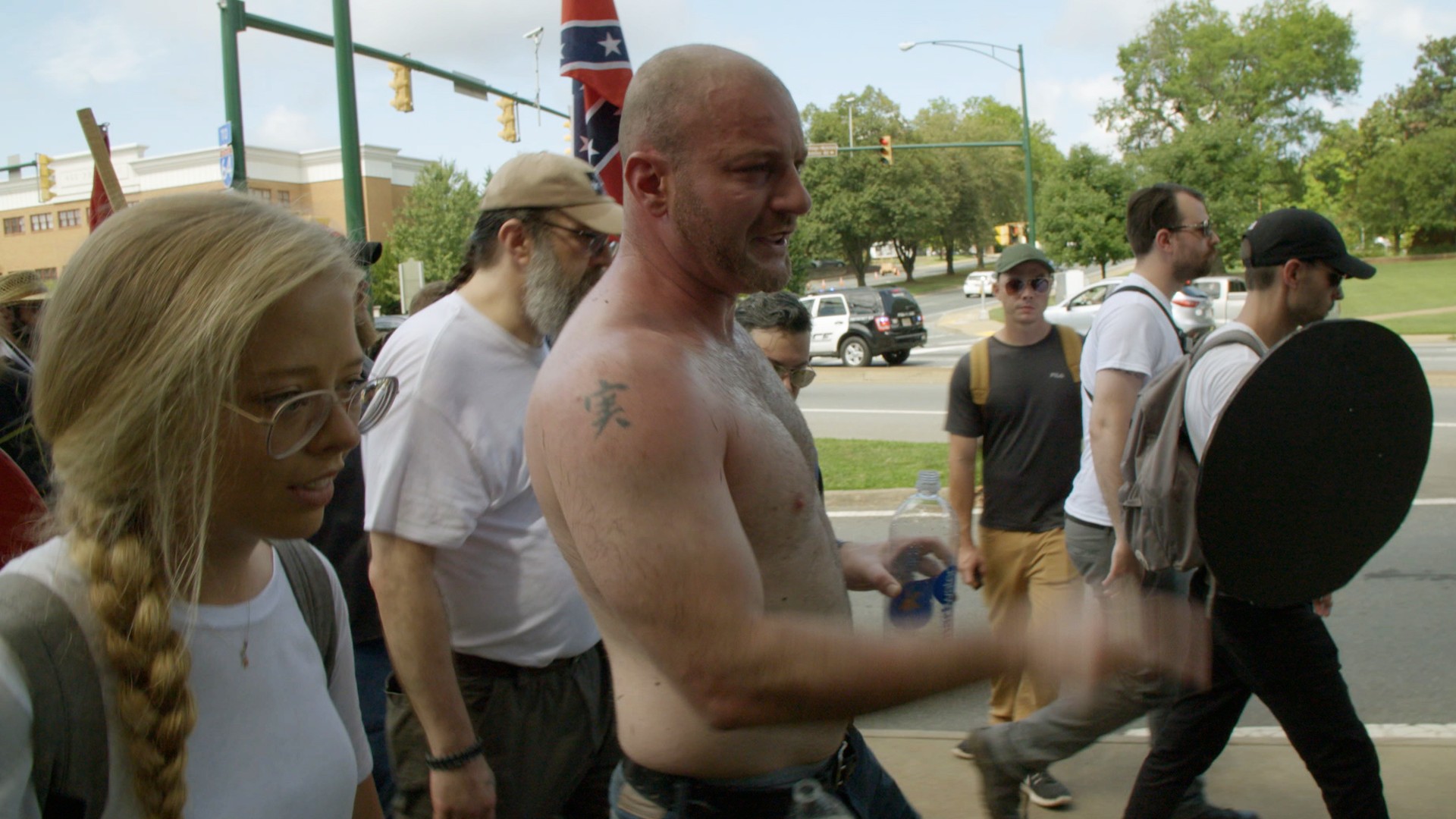This article originally appeared on VICE AustriaChristian Weissgerber was once a well-known neo-Nazi in Thuringia, a state in central Germany. A former Holocaust denier, Weissgerber was active in the far-right scene for much of his teens: he coordinated youth groups, performed in far-right bands and even found time to get a tattoo of a swastika on his leg.But eventually he got out and went on to study Philosophy. Initially, many of his fellow students refused to accept his conversion when they discovered his past – some even vandalised his home – but that soon changed when they got to know him. Today, he works in Berlin as a freelance educational consultant and translator.
Advertisement
I spoke to Weissgerber about his time as a neo-Nazi and the current state of the far-right across Europe.VICE: Hey Christian, what was fun about being a neo-Nazi?
Christian Weißgerber: Being hateful is fun, and it's a good way of releasing any pent-up anger. It also helps you feel more like a man.What were your former opinions on the Holocaust?
I went through different phases. For a while I thought there was no way it happened the way they were teaching it in schools. Then I started to believe that the gas chambers never existed; I decided that Jewish people were weaponising the issue to suit their own agenda.But in the end, I eventually realised that all that doesn't matter, because imprisoning people in concentration camps – places that even the most extreme Holocaust deniers admit existed – is criminal enough. Being able to understand that was my first steps back from being a Holocaust denier.How does someone even begin to think that the Holocaust might not have happened?
By consuming certain books, videos and lectures. At a point, you begin to convince yourself that you're smarter than everyone else because you believe that you've informed yourself in a way that they haven't.What were you hoping to achieve back then?
Initially, when I was still a member of the Völkischer movement, I wanted to see the restoration of the German Reich to its 1936 borders, the overthrow of the financial sector and the destruction of so-called "Masonic lodges". A lot of it was based on conspiracy theories.
Christian Weißgerber: Being hateful is fun, and it's a good way of releasing any pent-up anger. It also helps you feel more like a man.What were your former opinions on the Holocaust?
I went through different phases. For a while I thought there was no way it happened the way they were teaching it in schools. Then I started to believe that the gas chambers never existed; I decided that Jewish people were weaponising the issue to suit their own agenda.But in the end, I eventually realised that all that doesn't matter, because imprisoning people in concentration camps – places that even the most extreme Holocaust deniers admit existed – is criminal enough. Being able to understand that was my first steps back from being a Holocaust denier.How does someone even begin to think that the Holocaust might not have happened?
By consuming certain books, videos and lectures. At a point, you begin to convince yourself that you're smarter than everyone else because you believe that you've informed yourself in a way that they haven't.What were you hoping to achieve back then?
Initially, when I was still a member of the Völkischer movement, I wanted to see the restoration of the German Reich to its 1936 borders, the overthrow of the financial sector and the destruction of so-called "Masonic lodges". A lot of it was based on conspiracy theories.
Advertisement
I went on to join the Autonomous Nationalists, which was more of a youthful, modern form of fascism. We focused on providing people with incentives to repatriate back to their own countries.
WATCH: The Craziest Hippie Festival in the Jungle
That doesn't sound very different from what modern far-right movements like Germany's AfD or Austria's FPÖ are advocating.
We may not call the FPÖ or AfD Nazi parties, but it's confusing when they stand there and demand the same things that we used to. Back then, we wouldn't specifically mention the Nazis' blood and soil policy; instead, we'd rant about specific groups and returning the country to certain historical traditions. That's what the new right-wing are about, even if they don't phrase their beliefs in the same way. They always bring the argument back to geography and lineage, which is just the blood and soil policy in a different form.So what distinguishes your former fascist groups from most of today's conservative and far-right parties?
We would have expelled people whose families have only been in Germany for two generations. For example, even if you have never been to Turkey, as long as that's where your grandparents came from, we would push to have you sent back there.What do you think about the stereotype that neo-Nazis are generally dumb?
Being dumb isn't about the absence of knowledge, but rather an obsession with creating problems based on a world that doesn't exist. An example of this is the way neo-Nazis and right-wing populists are pushing this idea of the West being Islamised. They've built a fantasy world full of fake problems, and that's dumb.
WATCH: The Craziest Hippie Festival in the Jungle

That doesn't sound very different from what modern far-right movements like Germany's AfD or Austria's FPÖ are advocating.
We may not call the FPÖ or AfD Nazi parties, but it's confusing when they stand there and demand the same things that we used to. Back then, we wouldn't specifically mention the Nazis' blood and soil policy; instead, we'd rant about specific groups and returning the country to certain historical traditions. That's what the new right-wing are about, even if they don't phrase their beliefs in the same way. They always bring the argument back to geography and lineage, which is just the blood and soil policy in a different form.So what distinguishes your former fascist groups from most of today's conservative and far-right parties?
We would have expelled people whose families have only been in Germany for two generations. For example, even if you have never been to Turkey, as long as that's where your grandparents came from, we would push to have you sent back there.What do you think about the stereotype that neo-Nazis are generally dumb?
Being dumb isn't about the absence of knowledge, but rather an obsession with creating problems based on a world that doesn't exist. An example of this is the way neo-Nazis and right-wing populists are pushing this idea of the West being Islamised. They've built a fantasy world full of fake problems, and that's dumb.
Advertisement
Does it make a difference to neo-Nazis when they're publicly outed?
It can affect them in both positive and negative ways. Usually when a neo-Nazi is outed, they can no longer campaign in their neighbourhood and they could end up losing their job. But on the other side of that, it can drive them even deeper into the movement, as they're often celebrated for receiving that sort of attention from groups like Antifa and journalists. I think people need to consider whether or not the advantages of going after them outweigh the disadvantages. The far-right often win, because nothing really matters to them. Do you still get angry if you see a white woman with a black man?
Being radicalised affects you both in mind and body. For example, someone might understand that racism is stupid, but while watching porn they've suddenly stumbled on two people of different races having sex, and it's bothered theme. That sort of thing doesn't happen to me, though.Aren't fantasies like that appealing because they're forbidden?
It's not that simple. There's a clear belief among fascists that they shouldn't have sex with a black woman. But some people do, and convince themselves that it's OK because it's like "taming an animal" and so on. It's a very colonial way of thinking.
WATCH: Charlottesville: Race and Terror
Are neo-Nazis allowed to watch lesbian porn?
I can't speak on behalf of everyone. In most cases, it's not really an issue. Of the entire gay community, lesbians are the most accepted among neo-Nazis. Towards the end of the 80s, there was a debate among Nazis about whether it was OK to be gay. Some neo-Nazis said they were willing to accept homosexuality as a private matter – as long as the comrade's accomplishments on other fronts aligned with the movement. Of course, there are other groups that have a completely different approach to homosexuality. There were some skinheads who think women are so far inferior to men that they're not worth having sex with, so that's how they justify sleeping with each other.
It can affect them in both positive and negative ways. Usually when a neo-Nazi is outed, they can no longer campaign in their neighbourhood and they could end up losing their job. But on the other side of that, it can drive them even deeper into the movement, as they're often celebrated for receiving that sort of attention from groups like Antifa and journalists. I think people need to consider whether or not the advantages of going after them outweigh the disadvantages. The far-right often win, because nothing really matters to them. Do you still get angry if you see a white woman with a black man?
Being radicalised affects you both in mind and body. For example, someone might understand that racism is stupid, but while watching porn they've suddenly stumbled on two people of different races having sex, and it's bothered theme. That sort of thing doesn't happen to me, though.Aren't fantasies like that appealing because they're forbidden?
It's not that simple. There's a clear belief among fascists that they shouldn't have sex with a black woman. But some people do, and convince themselves that it's OK because it's like "taming an animal" and so on. It's a very colonial way of thinking.
WATCH: Charlottesville: Race and Terror

Are neo-Nazis allowed to watch lesbian porn?
I can't speak on behalf of everyone. In most cases, it's not really an issue. Of the entire gay community, lesbians are the most accepted among neo-Nazis. Towards the end of the 80s, there was a debate among Nazis about whether it was OK to be gay. Some neo-Nazis said they were willing to accept homosexuality as a private matter – as long as the comrade's accomplishments on other fronts aligned with the movement. Of course, there are other groups that have a completely different approach to homosexuality. There were some skinheads who think women are so far inferior to men that they're not worth having sex with, so that's how they justify sleeping with each other.
Advertisement
Is it dangerous for you to talk so openly about your time as a neo-Nazi?
If they want to kill me they can try. But overthinking it would be paralysing – that's how intimidation works.I just laugh now when I get death threats on Facebook, because I know those aren't the kind of people who would actually go through with it. We've had people defect directly to Antifa. They're the most targeted. I once heard someone suggest at a meeting that we lock all dropouts in a house and set fire to it.Are you still friends with anyone from that period of your life?
No, I lost most of my old friends around 2011. Some of them were really disappointed in me when I started inviting them to Marxist book clubs.Do you miss being a part of a group?
Yeah, for sure. Though I eventually disagreed with their beliefs, the solidarity was great – it was like being a member of a sport's club. You feel a sense of belonging even though you might disagree on whether gas chambers existed. Wouldn't it be better to just ignore the right entirely?
It's often hard to know how big these groups actually are, because they are split into so many small networks. But either way, size alone doesn't determine how influential a group is. We've seen movements with only a handful of members ruin plenty of people's lives.Correction: a previous version of this article incorrectly stated that the group Exit helped Christian leave the neo-Nazi movement.
If they want to kill me they can try. But overthinking it would be paralysing – that's how intimidation works.I just laugh now when I get death threats on Facebook, because I know those aren't the kind of people who would actually go through with it. We've had people defect directly to Antifa. They're the most targeted. I once heard someone suggest at a meeting that we lock all dropouts in a house and set fire to it.Are you still friends with anyone from that period of your life?
No, I lost most of my old friends around 2011. Some of them were really disappointed in me when I started inviting them to Marxist book clubs.Do you miss being a part of a group?
Yeah, for sure. Though I eventually disagreed with their beliefs, the solidarity was great – it was like being a member of a sport's club. You feel a sense of belonging even though you might disagree on whether gas chambers existed. Wouldn't it be better to just ignore the right entirely?
It's often hard to know how big these groups actually are, because they are split into so many small networks. But either way, size alone doesn't determine how influential a group is. We've seen movements with only a handful of members ruin plenty of people's lives.Correction: a previous version of this article incorrectly stated that the group Exit helped Christian leave the neo-Nazi movement.
